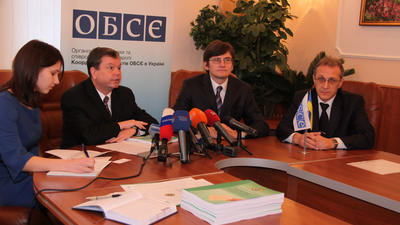-
Our work
-
Fields of work
- Arms control
- Border management
- Combating trafficking in human beings
- Conflict prevention and resolution
- Countering terrorism
- Cyber/ICT Security
- Democratization
- Economic activities
- Education
- Elections
- Environmental activities
- Gender equality
- Good governance
- Human rights
- Media freedom and development
- Migration
- National minority issues
- Policing
- Reform and co-operation in the security sector
- Roma and Sinti
- Rule of law
- Tolerance and non-discrimination
- Youth
- Field operations
- Projects
-
Meetings and conferences
- Summit meetings
- Review Conferences
- Ministerial Council meetings
- Plenary meetings of the Permanent Council
- Plenary Meetings of the Forum for Security Co-operation
- Security Review Conferences
- Annual Implementation Assessment Meetings
- Economic and Environmental Forum
- Economic and Environmental Dimension Implementation Meetings
- Human rights meetings
- Media conferences
- Cyber/ICT security conferences
- Conference of the Alliance against Trafficking in Persons
- Gender equality conferences
- Annual OSCE Mediterranean conferences
- Annual OSCE Asian conferences
- Partnerships
-
Fields of work
-
Countries
- All
-
Participating States
- Albania
- Andorra
- Armenia
- Austria
- Azerbaijan
- Belgium
- Belarus
- Bosnia and Herzegovina
- Bulgaria
- Canada
- Croatia
- Cyprus
- Czechia
- Denmark
- Estonia
- Finland – OSCE Chairpersonship 2025
- France
- Georgia
- Germany
- Greece
- Holy See
- Hungary
- Iceland
- Ireland
- Italy
- Kazakhstan
- Kyrgyzstan
- Latvia
- Liechtenstein
- Lithuania
- Luxembourg
- Malta
- Moldova
- Monaco
- Mongolia
- Montenegro
- The Netherlands
- North Macedonia
- Norway
- Poland
- Portugal
- Romania
- Russian Federation
- San Marino
- Serbia
- Slovakia
- Slovenia
- Spain
- Sweden
- Switzerland
- Tajikistan
- Türkiye
- Turkmenistan
- Ukraine
- United Kingdom
- United States of America
- Uzbekistan
- Asian Partners for Co-operation
- Mediterranean Partners for Co-operation
-
Structures and institutions
- Chairpersonship
-
Secretariat
- Secretary General
- Office of the Secretary General
- Conflict Prevention Centre
- Transnational Threats Department
- Office of the Special Representative and Co-ordinator for Combating Trafficking in Human Beings
- Office of the Co-ordinator of OSCE Economic and Environmental Activities
- Gender Issues Programme
- Opportunities for Youth
- Department of Human Resources
- Department of Management and Finance
- Office of Internal Oversight
- Documentation Centre in Prague
- Institutions
-
Field operations
- Presence in Albania
- Centre in Ashgabat
- Programme Office in Astana
- Programme Office in Bishkek
- Mission to Bosnia and Herzegovina
- Programme Office in Dushanbe
- Mission in Kosovo
- Mission to Moldova
- Mission to Montenegro
- Mission to Serbia
- Mission to Skopje
- Project Co-ordinator in Uzbekistan
- Closed field activities
- Parliamentary Assembly
- Court of Conciliation and Arbitration
- Organizational structure
- About us
Press release
OSCE Project Co-ordinator in Ukraine, Central Election Commission start nationwide training seminars for election commission members

- Date:
- Place:
- KYIV
- Source:
- OSCE Project Co-ordinator in Ukraine (closed)
- Fields of work:
- Elections
KYIV, 28 December 2009 - The first of 800 planned training seminars for precinct election commission (PEC) members ahead of the 17 January presidential election has started in Ukraine, announced the OSCE Project Co-ordinator in Ukraine (PCU) and the country's Central Election Commission (CEC) today.
The training seminars are taking place in the framework of co-operation between the PCU and the CEC. During the next three weeks, until 12 January, approximately 80,000 precinct commission members will be trained.
The seminars focusing on voting procedures on election day will target the heads, deputy heads and secretaries of PECs. For other election commission members, the PCU and the CEC have developed a special educational film that will be delivered to every PEC.
"Further capacity building of election commission members is a key recommendation of the OSCE Office for Democratic Institutions and Human Rights and is thereforeone a priority of the co-operation between the OSCE and the CEC," said Rene BeBeau, Senior Project Officer of the PCU.
The PCU and the CEC have already conducted training sessions for more than 2,600 district elections commission members. This is the third election for which the OSCE PCU has organized seminars for the CEC to train election commission members.
In future the PCU aims to support the CEC in conducting seminars on its own and will provide training materials and methodology.
"As a result of the co-operation between the CEC and the OSCE, we now have high quality study materials and training methodology that can help election commission members understand their responsibilities during the elections as stipulated by Ukrainian legislation," said Andriy Magera, Deputy Head of the Central Election Commission of Ukraine.
The training seminars are part of a project to further strengthen election processes in Ukraine that is implemented by the OSCE PCU with the support of the European Union, the Canadian International Development Agency, the Swedish International Development Co-operation Agency, Irish Aid and the Strategic Programme Fund of Britain's Foreign and Commonwealth Office.